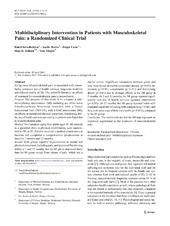Multidisciplinary intervention in patients with musculoskeletal pain: a randomized clinical trial
Peer reviewed, Journal article
Published version

Åpne
Permanent lenke
https://hdl.handle.net/1956/10741Utgivelsesdato
2016-02Metadata
Vis full innførselSamlinger
Originalversjon
International Journal of Behavioral Medicine. 2016, 23 (1), 1-11 https://doi.org/10.1007/s12529-015-9486-ySammendrag
Background Musculoskeletal pain is associated with comorbidity, extensive use of health services, long-term disability and reduced quality of life. The scientific literature on effects of treatment for musculoskeletal pain is inconclusive. Purpose The purpose of this study is to compare a multidisciplinary intervention (MI), including use of the novel Interdisciplinary Structured Interview with a Visual Educational Tool (ISIVET), with a brief intervention (BI), on effects on mental and physical symptoms, functioning ability, use of health services and coping in patients sick-listed due to musculoskeletal pain. Method Two hundred eighty-four adults aged 18–60, referred to a specialist clinic in physical rehabilitation, were randomized to MI or BI. Patients received a medical examination at baseline and completed a comprehensive questionnaire at baseline, 3 months and 12 months. Results Both groups reported improvements in mental and physical symptoms, including pain, and improved functioning ability at 3 and 12 months, but the MI group improved faster than the BI group except from reports of pain, which had a similar course. Significant interactions between group and time were found on mental symptoms (anxiety (p < 0.05), depression (p < 0.01), somatization (p < 0.01)) and functioning ability (p < 0.01) due to stronger effects in the MI group at 3 months. At 3 and 12 months, the MI group reported significantly less use of health services (general practitioner (p < 0.05)). At 12 months, the MI group reported better self-evaluated capability of coping with complaints (p < 0.001) and they took better care of their own health (p < 0.001), compared to the BI group. Conclusion The results indicate that the MI may represent an important supplement in the treatment of musculoskeletal pain.
